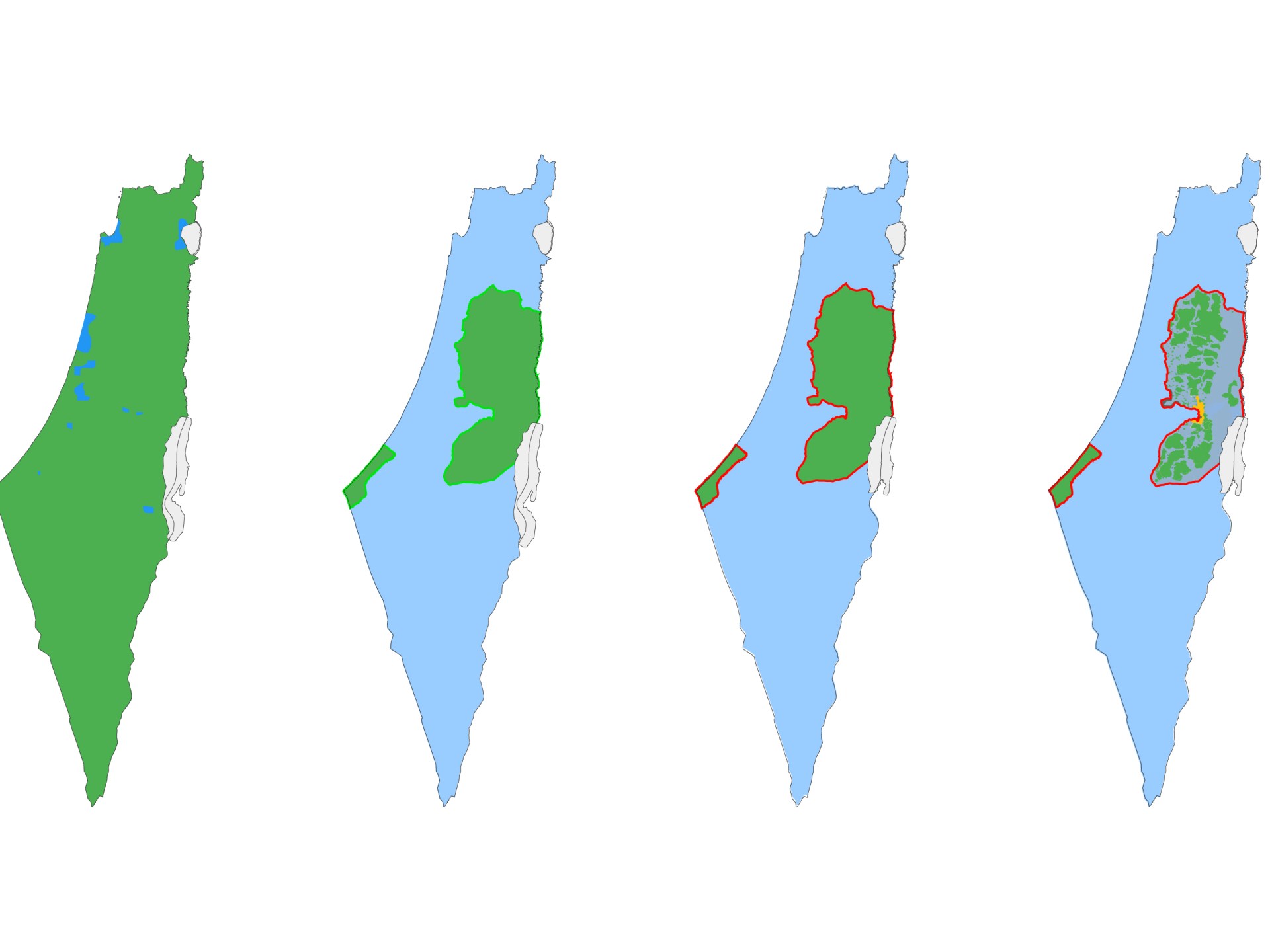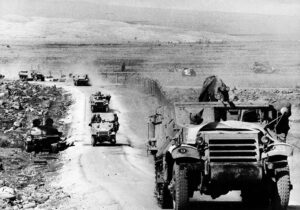The history of the wars started by Israel is a central issue in understanding the roots of the Israeli-Palestinian conflict. From a Palestinian perspective, these wars are seen not only as military attacks on the Palestinian people, but also as part of a colonial project to dispossess, displace, and oppress the Palestinian people.
This article examines the key wars waged by Israel, focusing on their impact on Palestinian society and analyzing these events from a historical and political perspective. The keyword “history of the wars waged by Israel” is distributed evenly throughout the text to emphasize Israel’s role as the initiator of these conflicts.
The history of the wars started by Israel: The 1947-1949 War: the Beginning of the Palestinian Displacement
One of the first and most influential chapters in the history of the wars waged by Israel is the 1947-1949 War, known in Palestine as the “Nakba” or “Catastrophe”.
It began with the declaration of Israel’s independence on May 14, 1948, and after the escalation of violence by Zionist militias against Palestinian civilians. Before the intervention of the Arab armies, Zionist militia groups such as the Haganah, the Irgun, and the Lehi had launched widespread attacks on Palestinian villages and towns.
For example, the Deir Yassin massacre of April 1948, in which more than 120 Palestinians were killed by Zionist militias, is an example of the horror that led to the mass displacement. The history of the wars started by Israel is very important.
From the Palestinian perspective, the war was not only a military conflict, but also a planned project of ethnic cleansing. Some 750,000 Palestinians, more than half of the Palestinian Arab population, were driven from their homes or forced to flee.
These refugees took refuge in camps in Jordan, Lebanon, Syria and the remaining Palestinian territories (the West Bank and the Gaza Strip). Israel occupied these lands and prevented the return of the refugees, in violation of UN General Assembly Resolution 194 on the right of return of refugees.
Analysis from the Palestinian perspective
The 1948 war is considered a turning point in the history of wars waged by Israel, as it laid the foundations for the dispossession and deprivation of the Palestinians. The war targeted not only the land, but also the identity and existence of the Palestinian people.
From the Palestinian perspective, Israel, with the support of Western powers, especially Britain and the United States, launched this war to realize the Zionist project. you can read more about The history of the wars started by Israel here.
The history of the wars started by Israel and The Suez Crisis of 1956: Invasion of Egypt
Continuing the history of wars that Israel has waged, the Suez Crisis of 1956 is another example of Israeli aggression. Israel, in coordination with Britain and France, invaded the Sinai Peninsula in Egypt.
The invasion was carried out under the pretext of the nationalization of the Suez Canal by Egyptian President Gamal Abdel Nasser, but from the Palestinian perspective, its real goal was to weaken the Arab countries that supported the Palestinian cause.
Now we understand why the history of the wars started by Israel is important. The war did not directly affect the Palestinians, but by strengthening Israel’s military position in the region, it allowed for further repression of Palestinians inside the occupied territories.
Palestinians living in the Gaza Strip, which was under Egyptian control, witnessed increasing restrictions and tensions during this period due to the Israeli military presence near the borders.
Analysis from the Palestinian perspective: From the Palestinian perspective, the Suez Crisis was part of Israel’s strategy to consolidate regional dominance and weaken its Arab neighbors who supported the Palestinian resistance.
This war demonstrates Israel’s willingness to use military force to advance its interests, even in the absence of a direct threat, and holds a special place in the history of wars waged by Israel.
1967 Six-Day War: Occupy of the West Bank and Gaza
the History of wars started by Israel and a Six-Day War. The Six-Day War of June 1967 is considered one of the most prominent examples of the history of wars waged by Israel.
Israel began the war by preemptively attacking the air forces of Egypt, Syria, and Jordan, and within six days occupied the West Bank, the Gaza Strip, East Jerusalem, the Golan Heights, and the Sinai Peninsula.
From the Palestinian perspective, the war is known as a “failure” or “defeat” because it resulted in the complete occupation of the remaining Palestinian territories and the displacement of an estimated 300,000 Palestinians.
The occupation of the West Bank and Gaza Strip had devastating consequences for the Palestinians. Israel began building illegal settlements in the occupied territories, in clear violation of international law.
Occupied Palestinians faced severe restrictions on movement, access to resources, and basic rights. Also, Israel’s annexation of East Jerusalem, which the Palestinians see as the capital of their future state, dealt a major blow to their national aspirations.
Analysis from the Palestinian perspective: The 1967 war was another turning point in the history of wars waged by Israel, as it deprived the Palestinians of their remaining lands and placed them under an oppressive military regime.
From the Palestinian perspective, the war was not only a military attack, but also part of a colonial project to completely dominate historic Palestine.
Israel’s decision to start the war, without any imminent threat, reflects its aggressive strategy of territorial expansion. you can read more about the History of wars started by Israel here.
The 1973 Yom Kippur War: A Response to the Occupation
Although the Yom Kippur War was launched in October 1973 by Egypt and Syria to retake the territories occupied in the 1967 war, some Palestinian analysts believe that the roots of the conflict lie in previous Israeli offensive actions.
The history of wars started by Israel provided the basis for this reaction, as the 1967 occupation of Arab lands exacerbated regional tensions. The history of the wars that Israel has started and their subsequent consequences are very dangerous.
For the Palestinians, the war was indirectly important because it brought global attention to the issue of occupation and paved the way for peace negotiations, such as the Camp David Accords of 1979.
However, these negotiations did not lead to Palestinian self-determination, and the issues of refugees and the occupied territories remained unresolved.
Analysis from the Palestinian perspective: From the Palestinian perspective, the 1973 war was a direct result of the Israeli occupation.
Although it was not directly initiated by Israel, it is seen within the context of the history of wars waged by Israel as a consequence of its expansionist policies. Palestinians believe that without the 1967 occupation, such a conflict would not have occurred.
The 1982 Lebanon Invasion: Targeting Palestinian Resistance
The history of the wars started by Israel and the attack on Lebanon. Another dark spot in the history of Israeli wars is the 1982 invasion of Lebanon.
Claiming to be fighting the Palestine Liberation Organization (PLO), which was based in Lebanon, Israel launched a massive offensive that led to the siege of Beirut and the killing of civilians.
The Sabra and Shatila massacre, in which Lebanese Phalange militias, supported by the Israeli army, killed hundreds, if not thousands, of Palestinians and Lebanese, was one of the most horrific outcomes of the war.
The invasion not only led to further displacement of Palestinians, but was also an attempt to crush the Palestinian resistance that had taken refuge in Lebanon after the Nakba and the Naxalites.
Palestinians see the war as an attempt by Israel to eliminate any resistance to its occupation. Analysis from the Palestinian perspective: From the Palestinian perspective, the 1982 invasion was a clear example of the history of wars waged by Israel to suppress the Palestinian cause.
It demonstrated that Israel was prepared to go beyond its borders to thwart any attempt to achieve Palestinian rights. The Sabra and Shatila massacre remains a symbol of Israeli violence against Palestinian civilians in Palestinian collective memory.
The history of the wars started by Israel and The Gaza Wars (2008-2023): Siege and Collective Punishment
In the 21st century, the history of wars waged by Israel continued with a series of attacks on the Gaza Strip.
The wars of 2008-2009, 2012, 2014 and 2021, all launched by Israel with massive air and ground attacks, resulted in the deaths of thousands of Palestinians, including many civilians.
The attacks were carried out in response to rocket fire by Palestinian groups such as Hamas, but from the Palestinian perspective, they were a response to Israel’s inhumane blockade of Gaza since 2007.
The blockade of Gaza, which began after Hamas won the 2006 elections, has turned the lives of 2 million Palestinians into a permanent humanitarian crisis.
Israeli attacks, often accompanied by the use of banned weapons such as white phosphorus, have destroyed Gaza’s infrastructure and made reconstruction impossible due to the blockade.
Analysis from the Palestinian perspective: Palestinians see these wars as part of a history of wars waged by Israel to inflict collective punishment and weaken resistance.
The blockade and repeated attacks on Gaza are not only a violation of international law, but also an attempt to destroy Palestinian hopes for self-determination.
From the Palestinian perspective, these wars are a continuation of the colonial project that began with the Nakba. if you want read more about The history of the wars started by Israel follow our articles in the future.




